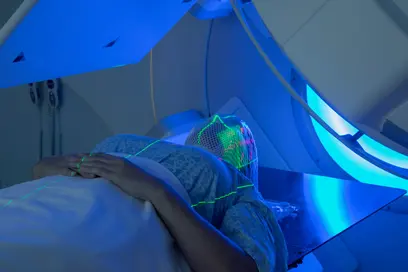In Germany, as in other industrialized countries, radiation therapy is a high-tech procedure: The radiation beam is produced by a linear accelerator that moves with utmost precision around the patient. Special software ensures that the right dosage is delivered and computer-controlled collimator systems automatically shape the radiation beam to conform to the shape of the tumor.
However, such expensive linear accelerators rely on stable power supply and do not tolerate any voltage fluctuations. Therefore, it is often not possible to use them in countries of the third world. Instead, many hospitals there treat cancer patients using devices called cobalt machines delivering radiation from the radioactive isotope cobalt-60. These machines generate radiation beams of relatively large, invariable cross sections which could so far not be customized to the shape of the tumor.
At the annual convention of the American Association of Physicists in Medicine (AAPM) in Charlotte, USA, scientists from DKFZ and Precisis have now presented the prototype of a mechanical radiation collimator that makes it possible, for the first time, to precisely customize the beam to the tumor shape even in cobalt machines. The novel collimator called CobRaLeaf* consists of many closely arranged, moveable metal leaves and can be mounted on existing cobalt machines. The leaves form a radiation window that is exactly adjusted to the target area. The goal of any precision radiotherapy of cancer is to deliver the highest possible radiation dose to the tumor while sparing the surrounding normal tissue.
“So far, such radiation collimators were available only for linear accelerators," says Prof. Wolfgang Schlegel of DKFZ. “With CobRaLeaf, the shape of the leaves is adjusted manually. But this is a great advancement over previously used rectangular radiation beams."
“Progress in medicine does not necessarily have to be expensive. On the contrary, wide-spread use of economically reasonable treatment devices may save more lives than isolated high-end devices," says Dr. Angela Liedler, president of Precisis. Approximately 2,000 hospitals in the third world use cobalt-60 machines and could benefit from CobRaLeaf. Series production of the collimator will start in 2013.
*CobRa stands for cobalt and radiation.



